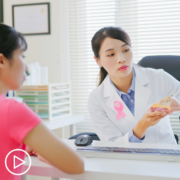What Are Common Barriers to Clinical Trials Access?
What Are Common Barriers to Clinical Trial Access? from Patient Empowerment Network on Vimeo.
Clinical trials are key to the approval of new breast cancer treatments. But what factors could prevent some patients from participating? Expert Dr. Jame Abraham reviews common barriers and emphasizes the commitment of the oncology community to improving trial access.
Dr. Jame Abraham is the chairman of the Department of Hematology & Medical Oncology at Cleveland Clinic and professor of medicine at Cleveland Clinic Lerner College of Medicine. Learn more about Dr. Abraham.
See More from Breast Cancer Clinical Trials 201
Related Resources:

|

|

When Should Breast Cancer Patients Consider a Clinical Trial? |
Transcript:
Katherine:
Dr. Abraham, what are barriers to accessing clinical trials?
Dr. Abraham:
That’s a really good question. I think we need to continue to work on breaking down the barriers. And the most common barrier is, wherever she, or he, are going for the treatment, they don’t have access to a client. There’s no trial available. The second, let’s just say, if I can say, the lack of awareness from the provider, or the patient’s side, about the importance of trial. And then, third, some trials can be complicated. So, it requires multiple appointments, or multiple trips to the doctor’s office, or the hospital, or the cancer center. So, that may not be feasible for everybody. Somebody has limited access, limited support, it can be tough.
And then, let’s just say, that people have comorbid conditions, if I can say. Other conditions, heart disease, or other things, or they’re not able to be more active, and some of those things, can make that person ineligible for a trial.
So, there are a number of things, potentially, can be barriers, but I think, as an oncology community, as cancer centers, we need to continue to work on optimizing, or breaking down, these barriers.
As a nation, we have a huge – we have a lot of work in addressing the disparities in cancer care.
As you know, where you’re born, and it can be innercity, Cleveland, innercity, Detroit, or it can be in the Appalachia, where you’re born, and what’s your access to healthcare, that plays a major role.
And, of course, your race, and your education, I know that plays a major role in access to healthcare, and then, able to continue with treatment, and that plays a similar role in clinical trials, too. So, the number of patients entering clinical trials from different race, especially African American patients, are less, compared to the other patient population. So, there is a lot of work, need to be done, in addressing the disparities in cancer care, in general, and especially clinical trials.
Katherine:
And I imagine that’s a focus for many of the people working on trials?
Dr. Abraham:
It’s a focus for National Cancer Institute, it’s a focus for all the cancer centers, absolutely.






